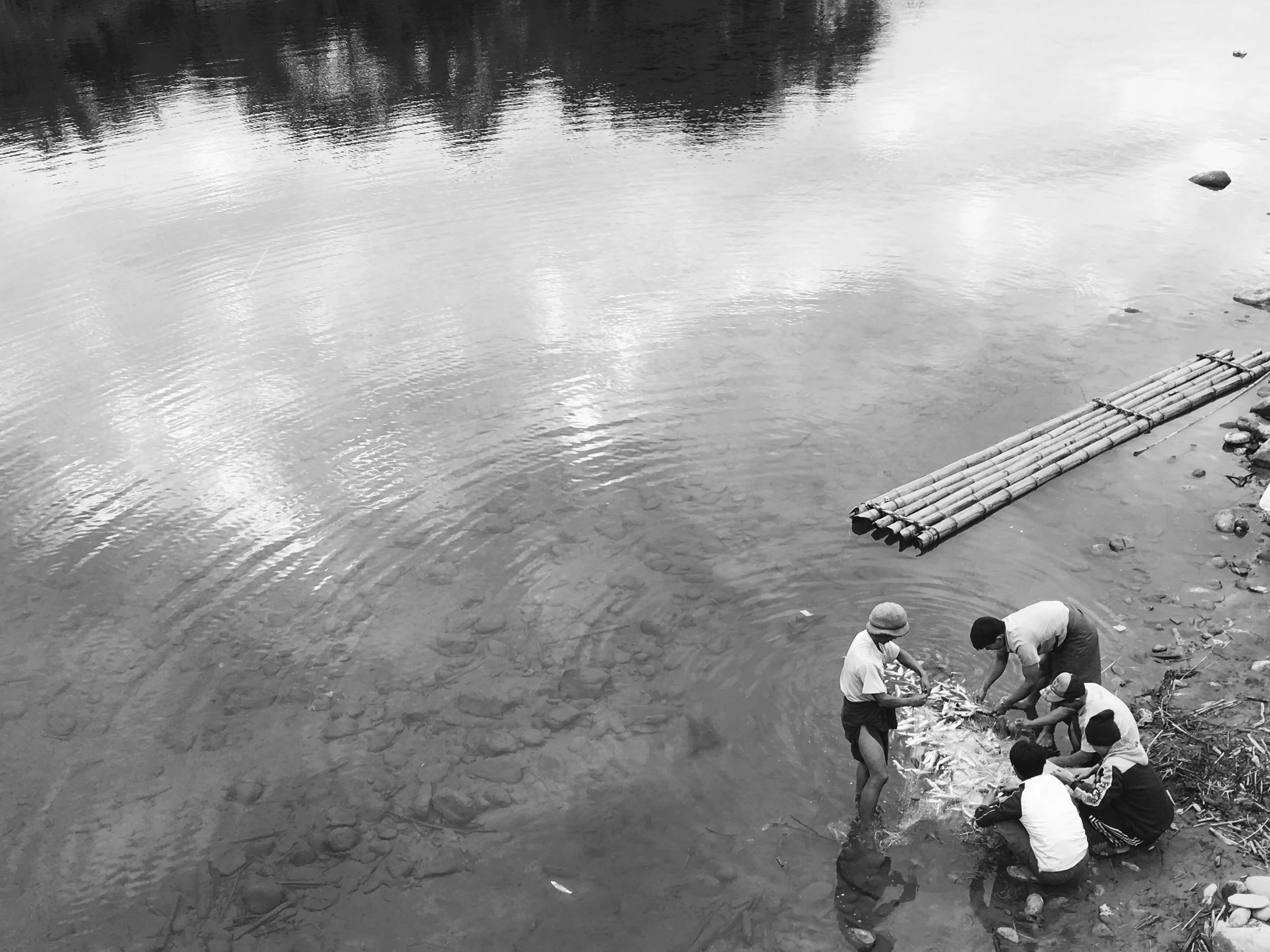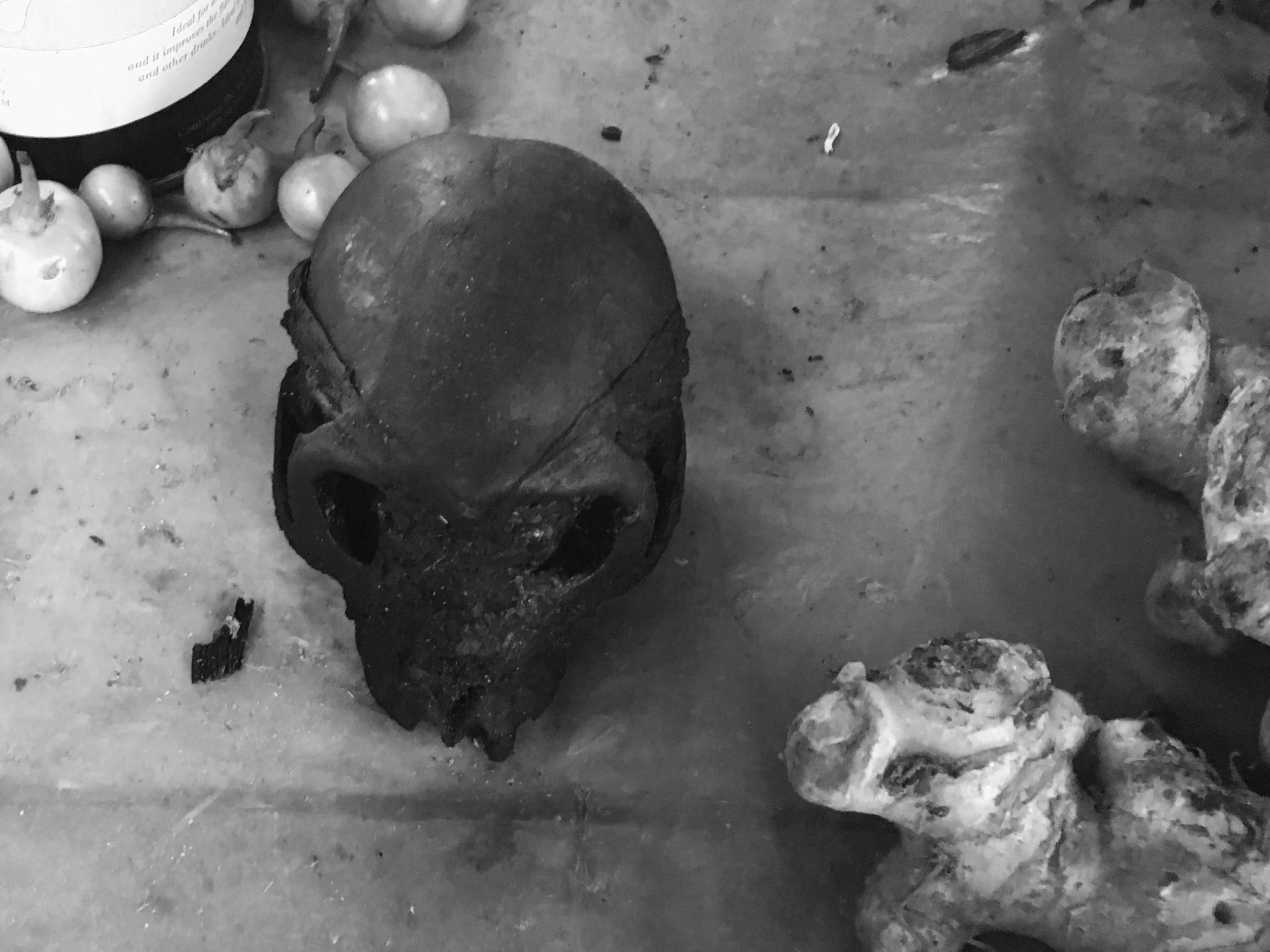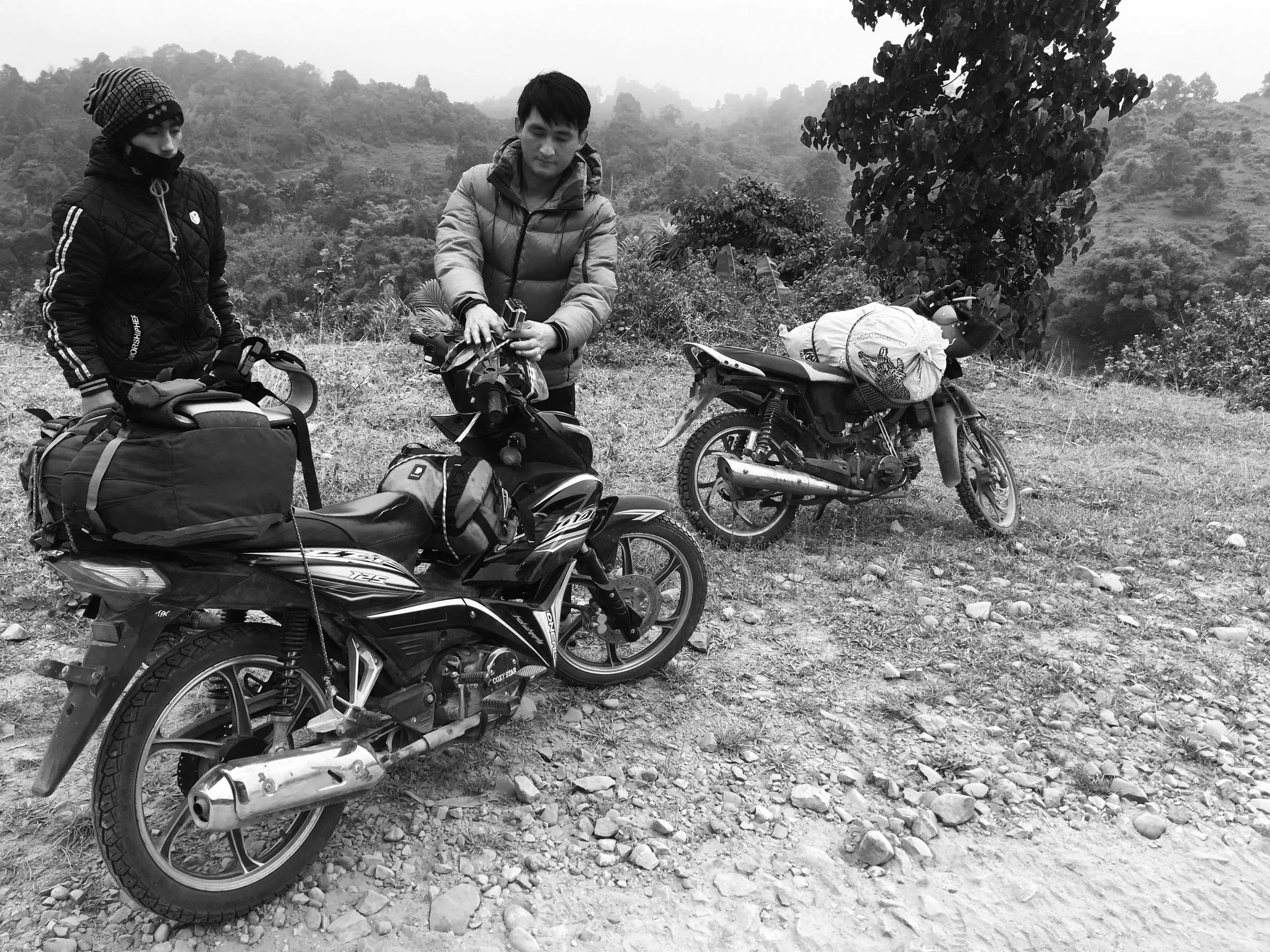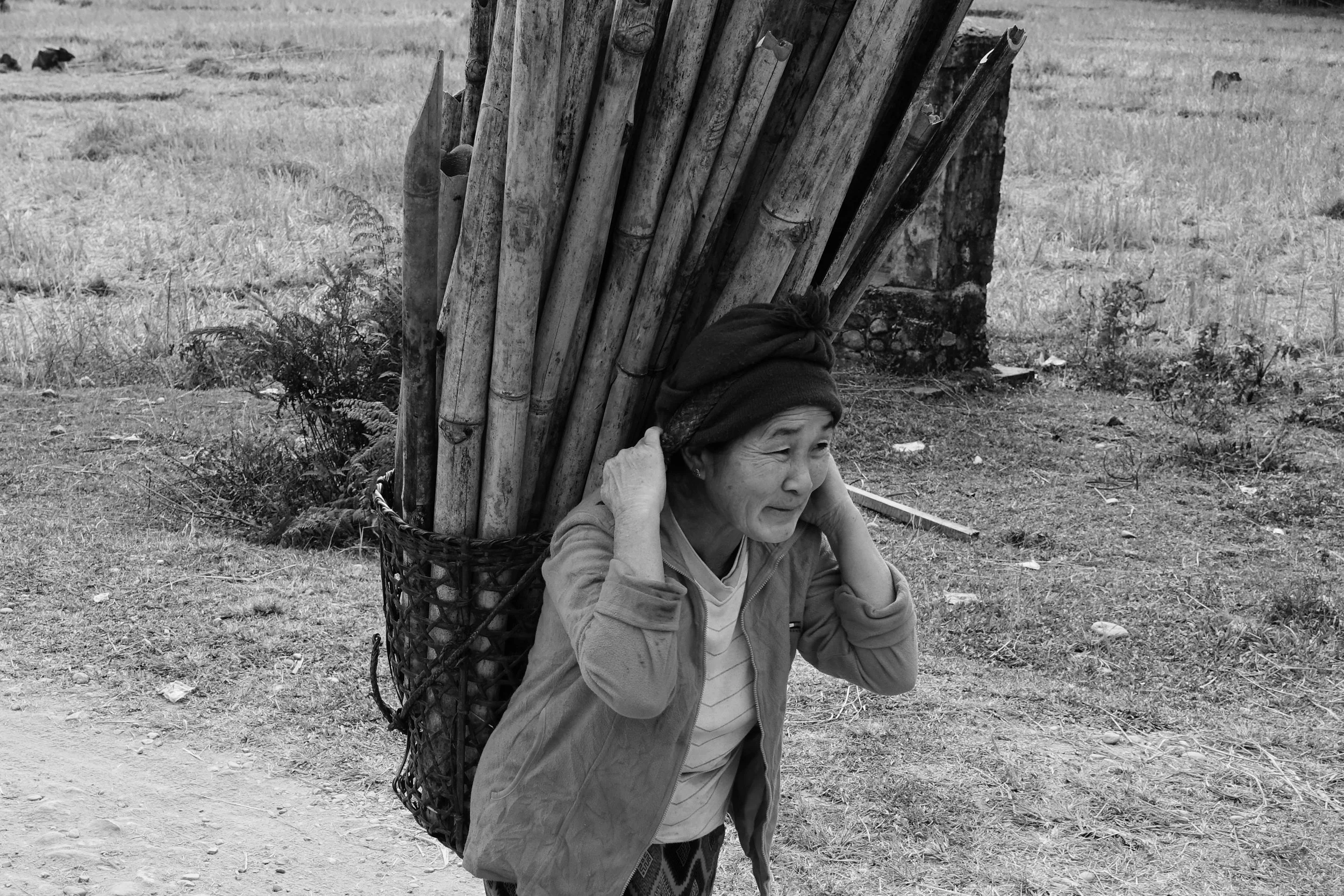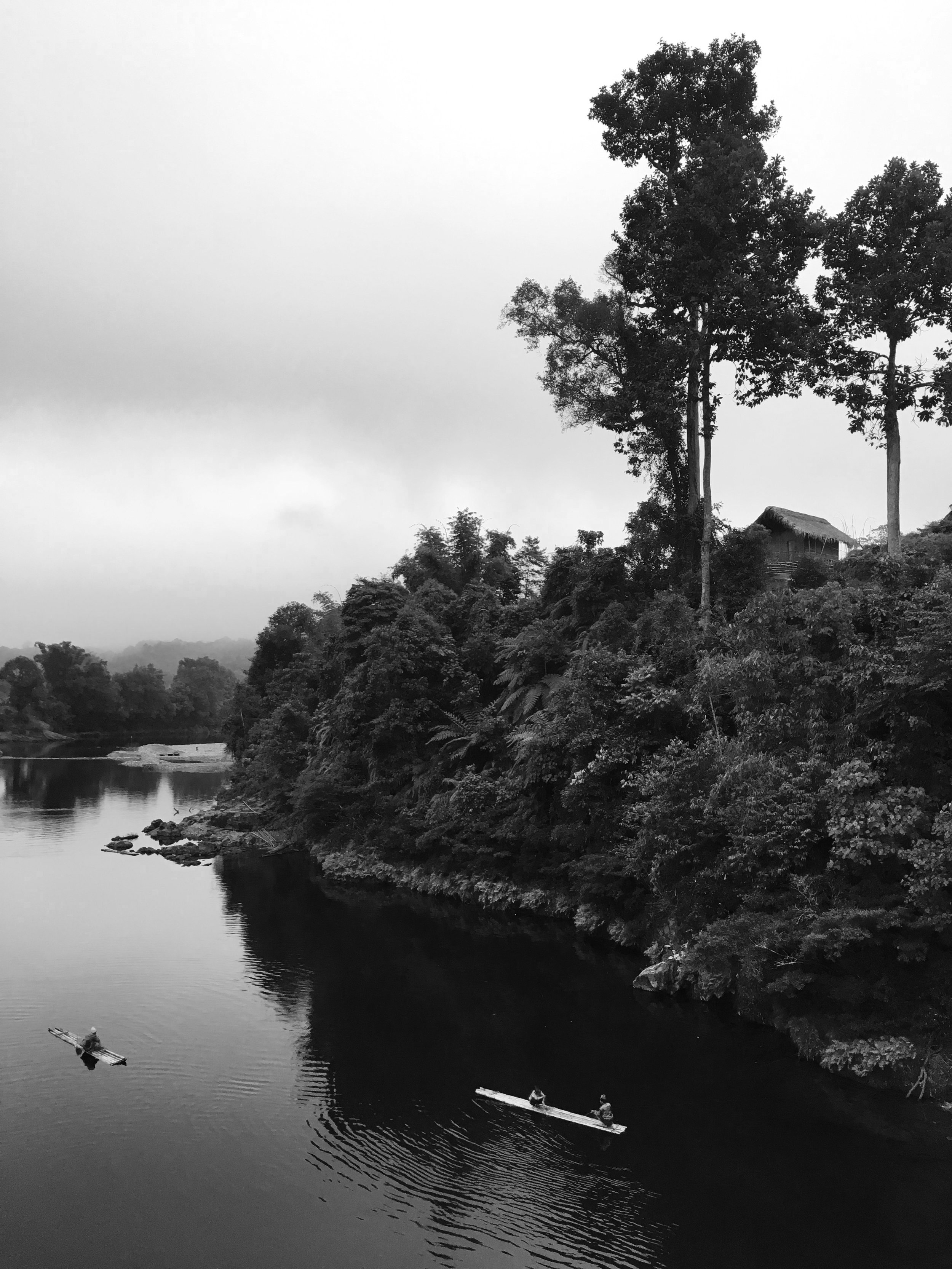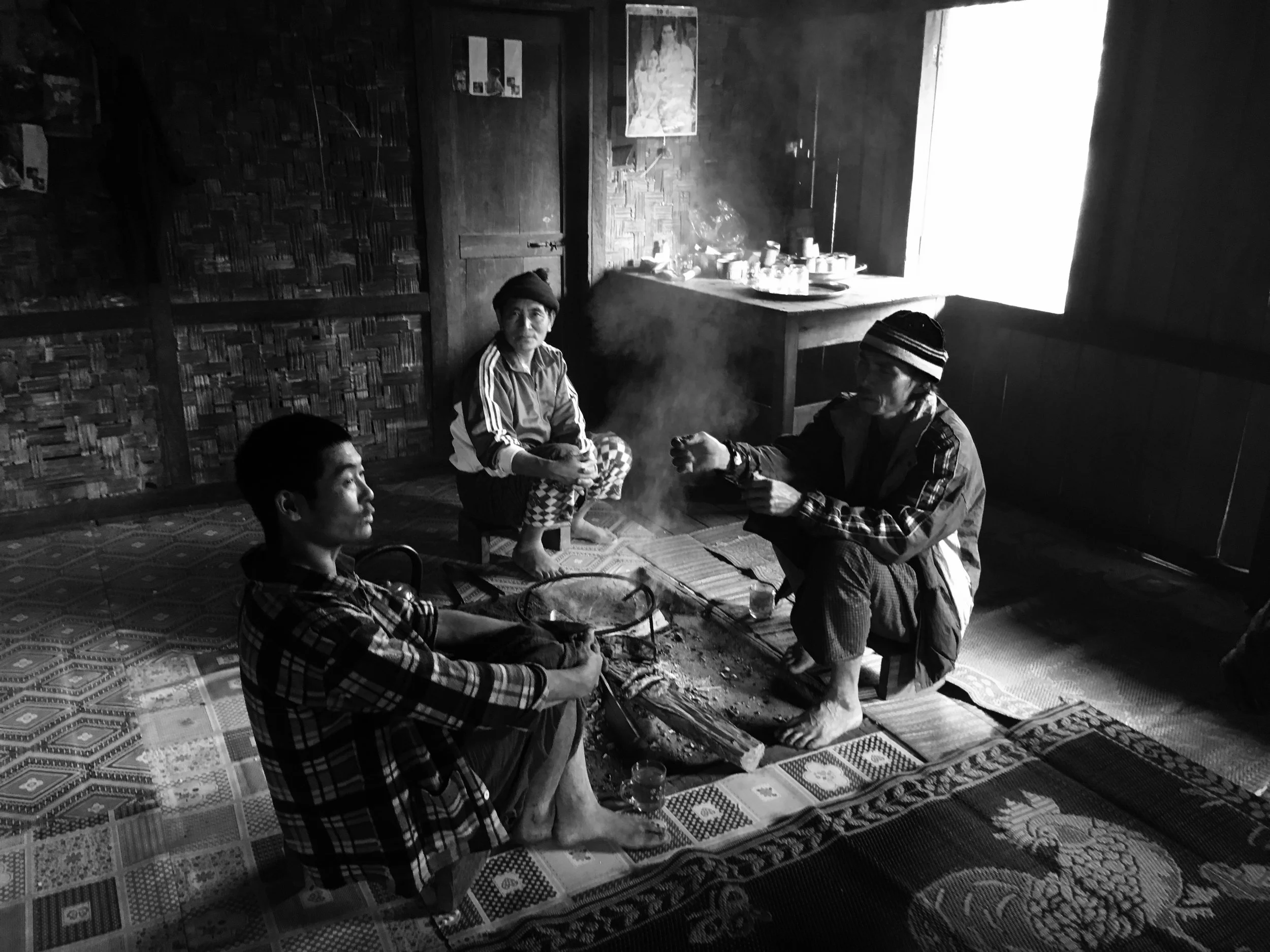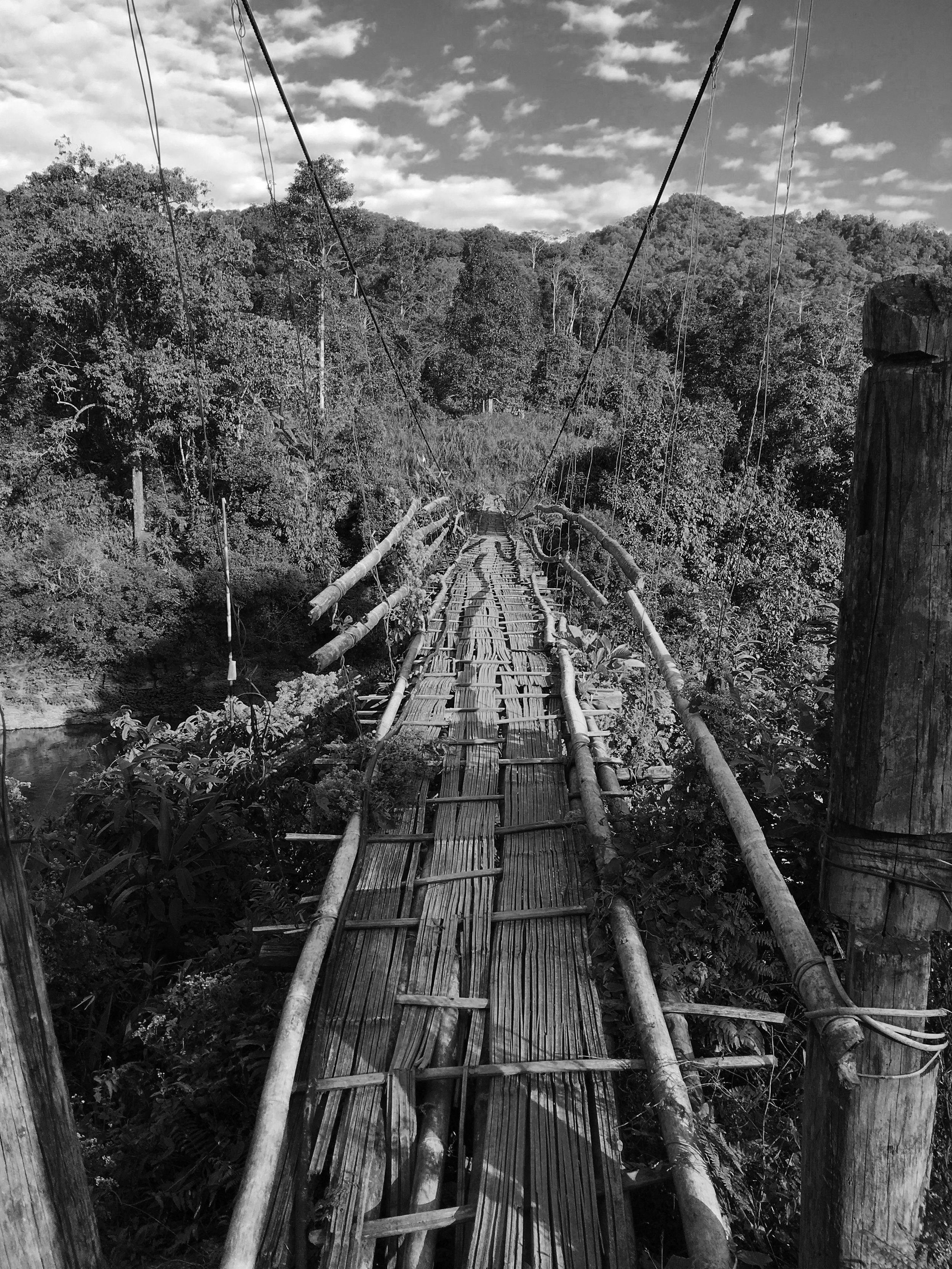The Forgotten Frontier
The headgear made of bamboo and curved animal tusks was a dead giveaway that the small boy sitting across from me in the departures area was going to be on the same flight. Clearly not from around these parts, he adjusted his unusual hat a little nervously as he peered wide-eyed around Yangon’s domestic airport terminal. Another obvious fellow traveller wandered past clutching a boarding pass as though his life depended on it, his hands encased in woolly mittens despite the 30-degree heat outside.
Our twin-prop plane made two stops on its journey northwards and at each one the airports got smaller, the runways got worse and we disgorged the banal-looking passengers to take on more interestingly-attired ones like these two. Soon it was me, with my western clothing and lack of tusks who began to look out of place.
The final leg of the flight took us over tens of kilometres of densely forested mountains ribboned with rivers, with not a house, field, or even a plume of smoke in sight. After one last descent and the bumpiest landing of them all, we rolled to a standstill outside the small buildings of Putao airport. This was Burma’s northernmost airstrip, and probably its northernmost anything. It would be my jumping off point for exploring the remote region of Kachin in the foothills of the Burmese Himalayas.
Putao felt more like a village than a town. There was one main street with a handful of open-fronted shops, a small market, a school and a church. Thanks to the efforts of 20th Century American missionaries the locals in these parts are Christian rather than Buddhist like much of the rest of the country, or animist like their ancestors. There were only two restaurants but whatever you ordered it would undoubtedly be fresh as hunting is one of the main pastimes here, undertaken either with a vintage rifle or a homemade crossbow.
Walking round the market, in between the potatoes and cabbages, the fresh herbs and the ginger root, I spotted something small, round and blackened that I couldn’t quite place at first. Some further enquiries with broken interpretation via a friendly local schoolteacher revealed that it was, or rather had been, a gibbon. It is believed, I was told, that the brain of this critically endangered species would cure colds and cramps.
I was the sole lodger at the guesthouse I was booked into. The decades-long war between the Kachin Independence Army, which is fighting for more regional autonomy, and the Burmese military had escalated recently. The authorities were also jittery following the death by disease of a British botanist some weeks earlier.
With the onset of dusk, the temperature outside fell into the low single figures and I warmed my hands over the log fire. Around 9pm the power cut out. I tried to text my guide to ask what time we’d need to head off the next morning, but the mobile network was down too.
By candlelight I joked with the staff that things didn’t seem to have improved much since the new government, led by Aung San Suu Kyi, had come into power eight months back, ending more than half a century of military dictatorship. They shrugged and told me that, apart from the army, most vestiges of the state simply don’t make it this far north.
Had I noticed, they asked, that not a single one of the few vehicles driving round town had a license plate? None of their drivers had licenses either, my hosts explained. As there was nobody to check them it wasn’t thought necessary. The prevailing wisdom was that you could either drive or you couldn’t, and if you couldn’t then the local road conditions would kill you soon enough.
Despite the knowledge that I’d be joining these less-than-qualified road users the following day, I slept well that night. It was the last mattress I’d see for at least a week, so I had to take advantage. An hour after sunrise, my guide Aung showed up with our motorbikes. They were not much to look at. Battered old 125cc Chinese-made Hondas which looked as if they might break on their first encounter with a medium-sized rock. I gave the tyres a kick and squeezed the brakes to make sure at least the bare essentials were functioning and then carefully bungeed my backpack onto the back half of the seat. After I’d climbed on, I went to adjust the mirrors only to find that there were none. Ah well, at least it started with the first kick.
We headed northwards out of town and within a few minutes all signs of human habitation had disappeared. A dirt track wound us deep into hills swathed in thick jungle, glistening and dripping following a recent rain shower. Thankfully other traffic was limited to the odd motorcycle and truck, wheezing and grinding up the steep inclines, so being without mirrors was actually no great loss.
There were plenty of streams and rivers to cross and the further we got from Putao, the more rudimentary those crossings became. They started out as pretty sturdy metal suspension bridges, then deteriorated into older wooden structures, then simple plank crossings, and finally disappeared altogether. That meant shifting down into first gear, gunning the throttle and going for it, hoping the river was neither too deep nor concealing any large underwater rocks that would throw you off.
It was, however, becoming increasingly clear that the bikes were much better suited for all this than they looked. They skipped over the rocks and mud and through the water without complaining or threatening to stall. Another benefit of their small size and light weight, became apparent when we encountered a landslide that had blocked the road. It was simply a matter of dismounting, picking up the bike, and strolling right over it.
Villages were few and far between; we’d pass maybe one an hour, just a few wood and rattan houses on stilts and if we were very lucky, a tea shop. Whenever we stopped people would invariably come up, shake hands and smile, offering to share whatever food they had and ask us where we were heading and why.
This last question seemed to be of particular interest. In an area where, given the long distances and tough conditions, people travel only if they really have to, the idea of a foreigner making a journey voluntarily, even going so far as to pay for the privilege, was simply bizarre. A frequent presumption was that I must be looking for some kind of business opportunity, perhaps scouting for jade, or maybe a timber concession. No? Then might I possibly be interested in a couple of nice fresh tigers’ pelts?
In the mid-afternoon we passed a lonely army outpost. Its dozen or so wooden buildings could have been mistaken for any other village, except they were surrounded by a bamboo palisade with sharpened spikes sticking out diagonally. I was told that only six soldiers lived there and they hated it. They came from far away in the lowlands, didn’t speak any local languages, and rarely left the barracks.
The barricades were oddly incongruous in an area inhabited by people who were among most hospitable and friendly one could hope to find – and very few of them at that. Yet many of the locals here would prefer autonomy from the rest of Burma, and some are actively fighting for it. Those unfriendly sharpened stakes served as a sobering reminder of the ongoing conflict in the area, and the tarnished legacy left by the British Empire that is one of its root causes.
At the start of the Second World War, Burma was being ruled as a British colony. When the Japanese invaded the country in 1942 the Burmese made a pact with them, promising to help kick the British out and open the way for the Japanese advance towards India. In return, Japan agreed to leave Burma a free and independent country after the war.
But the non-Burmese, the people of Kachin Province and the other multiple ethnic groups who live in the highlands on the peripheries of Burma, went the other way. They promised to help the British fight the Japanese and their Burmese allies in return for future support for independence for their respective regions. They kept their side of the bargain. Their knowledge of these wild lands and their toughness as fighters were crucial in overpowering the enemy and eventually pushing the Japanese out of Burma.
The British were not quite so honourable when the war ended however. All over the world, they dumped their colonial baggage with little consideration for the mess they might be leaving behind. In areas like Kashmir, between India and Pakistan, the consequences are well-known. But in lost slivers of land like northern Burma, they are largely forgotten by the outside world. And so the struggle for independence still rages on today, with regular skirmishes between local armed groups and the Burmese Army.
As the sun dipped behind the hills we drew into a small hamlet that sloped down to a wide river. It was nothing more than a scattering of stilted dwellings, a couple of chicken and pig pens, and a church. I was ushered towards the house we’d be spending the night in where the local pastor, an elderly man sporting diamond-checked jester trousers, an “Adidos” zip up sweater and a woollen bobble hat, stood beaming at the top of the stairs. He shook my hand warmly and showed me inside where a fire pit was crackling to life in the middle of the room. I was invited to drink tea with what turned out to be most of the rest of the village, whether coming to seek counsel from the pastor or to ogle at the foreigner, I wasn’t quite sure.
As it turned out I wasn’t the only foreigner in the room. On the wall I found an old, framed black and white photo of a white-haired gentleman in spectacles. I signalled to it and pulled a quizzical face to ask my hosts who it was. “Mr. Morse! Mr. Morse!” they replied in unison. Well this was quite the coincidence. Before setting out on the trip, in a dusty bookshop in the backstreets of Yangon, I’d come across a book with a title that was simply too good to pass up, “Exodus to a Hidden Valley”, and it happened to contain this man’s remarkable life story.
Mr. Morse was an American missionary who, along with his family, came to Putao in the 1950s after some extensive proselytising in China. Today, around 90 per cent of the locals are churchgoing, but at that time there was not a single Christian in this part of northern Burma. Clearly this Mr. Morse was a very charismatic man.
However, in 1962, at the height of his conversion and church-building fervour a military coup in Yangon installed the first in the long line of military dictators who were to rule over the country for the next fifty years. These were not the kind of people who were very amenable to foreigners, especially dangerously charismatic Christian foreigners. Predictably, Mr. Morse was soon ordered to leave the country. But instead of heading to the airport he and a group of local converts snuck out of Putao and into the mountainous, uninhabited jungle that lies between the town and the Indian border to the west.
They hacked their way through dense, inhospitable, terrain for a couple of weeks until, confident of having evaded pursuit, they settled in a remote valley. There they cleared the jungle, felled trees to build houses, planted crops, and even salvaged parts of crashed wartime aircraft that they found in the bush which they used with a homemade waterwheel to generate electricity.
In short, they established their own civilisation from scratch in the middle of the wilderness. And like Robin Hood and his merry men, they lived there in relative comfort with zero contact with the outside world for over six years. Eventually, the army tracked them down and deported Mr. Morse. But his name and legend lives on in the churches found in every small village, and the odd fading photo on a pastor’s wall.
I took my place around the hearth as a couple of smiling old ladies arrived bearing generous platters of rice, potatoes and fish. We ate with our hands as the fire sputtered and the sounds of crickets and cicadas drifted in through the open windows. Once plates had been cleaned, an old battered and blackened metal kettle was hoisted over the embers and some tea brewed up accompanied by the lighting of long, dark green Burmese cheroots and a series of satisfied sighs.
I retired to my room after a while, leaving the villagers to smoke and chat, to get news of their neighbours, of other villages, maybe even of Yangon. Far beyond the reach of TV and newspapers, let alone social media, Aung effectively acted as a one-man Facebook up here. With his almost constant travelling through the region, he connected people and places, events and stories, to provide a news feed that otherwise simply would not exist.
The following morning, sipping tea and eating eggs as we watched two fishermen launch their boats onto the river, I commented to Aung how remote the area felt. He laughed. Pointing out a track leading up the opposite bank of the river he told me it was only passable on foot, and would bring you to the next village in about three days.
There, basics like cooking oil or matches cost three times as much given the extra effort required to transport them. Most children had no chance of an education unless their parents were prepared to pack them off to a boarding school, and if you got really sick you had to hope you’d last the five days it would take to get to the nearest hospital. Once you reached this village you could start feeling a little remote, he corrected me with a smile. My western fantasy of an idyllic pastoral life far from the madding crowd started to crumble.
After breakfast, we strapped our bags back onto the bikes and set off along a narrow muddy track through the village that led to a long suspension bridge over the river. Some accident, presumably of nature, had forced the planking downwards, tilting towards the water at an alarming angle. Walking across, you could at least grip the steel cables which ran along on either side, but on a motorcycle that was impossible. Instead the only option was to accelerate and build enough momentum to keep yourself upright, but not so much as to make it impossible to swerve around the missing planks that started appearing halfway across. Both the bike and I were shaking by the time we reached the other side.
The following few days continued in a similar manner, with the tracks becoming steadily narrower, and the bridges steadily more impassable. My intention was to get as far north in Burma as it’s possible to go by motorcycle and finally, after a day spent skidding over loose rock and mud, often dangerously close to the cliff edge, the track narrowed so much that further progress on two wheels became impossible. We came to a halt just as my nerves were about to give out. The next road could be found a week’s walk to the north, on the other side of the Chinese border.
As we left the bikes propped up against the rock wall and continued upwards on foot, I have to confess I felt relieved to be temporarily rid of them. We climbed up to a ridge where we had a panoramic view over chains of grey and green mountains, leading off to India in one direction and Chinain the other. To the north, they rose dramatically and their peaks gleamed white, the eastern edge of the Himalayan range.
We could just see the next village in the far distance, another half day’s walk away. It was just a scattering of wooden houses and a couple of fields eked out on the only areas of flat ground in the vicinity, the rest was all jungle and mountain with not a man-made structure in sight. Yet even from this spot I was told it would take another eight days of hiking to reach the remotest village in Burma.
This was also where you would find the last remaining Taron, or Burmese pygmy. Over the years, other tribes had enslaved these people, taking advantage of their small stature and as result they had started to live separately. However their extreme isolation led to in-breeding, which inevitably meant increasing cases of child mortality and birth defects.
Finally, in the 1980s, a momentous decision was taken by the whole community that from that point on they would have no more children. It would be better to go extinct, they decided, than to continue like this. The result of this heart-breaking voluntary pact was that now only one member of the tribe, a man in his late fifties, remained.
I was still ruminating on such a lonely, remote life as we turned back in the direction of Putao a few days later. I’d been reading another book I picked up in Yangon, another racy-sounding title called: “British Escape through the Jungles of Death”. It told the story of the mass exodus of British and Indian colonial administrators who fled through these jungles and mountains as the Japanese advanced.
Some half a million attempted the journey, often trying to take along as many of their valuables and possessions as they could. While many made it across the Indian border, tens of thousands perished due to the appalling conditions. For years afterwards there were stories of local villagers discovering engraved candlesticks or once-elegant armchairs deep in the jungle where they had been abandoned.
If my trip had felt like a journey to the very edge of civilisation, I couldn’t imagine what it must have felt like to those urbanized westerners who had passed through this region previously. What would those Brits and Indians fleeing the Japanese, or indeed Mr Morse the missionary, have thought of these places? What hardships must they have endured? Both me and my bike were filthy, and every muscle in my body was aching. But I was enormously thankful that this appeared to be the extent of my suffering.
Except that Kachin had one more slightly scary surprise in store for me. In one village we met three bikers coming the other way, who told us rumours of fighting just a day or so away. More worryingly they also told us that the Burmese Army was on the lookout for a foreigner. That must be me. Whether they wanted to avoid having any pesky international witnesses to the conflict or whether it was for my own safety, it wasn’t quite clear. But Aung looked concerned, and decided that we should cut our trip short.
A shortcut meant we could reduce the multi-day journey to a single stint, but it was a long, hard slog. It wasn’t until we finally hit tarmac (what a wonderful innovation!) and approached the outskirts of Putao that I started to relax. Then I saw that the road ahead was blocked by two army trucks. Troops clenching sub-machine guns waved us down. It turned out that they had been looking for us for three days.
The day after we’d left Putao, the military had heard reports of “rogue forces” operating in the area and were now on a mission to flush them out. That meant they had also banned all foreigners from this part of Burma. After animated discussion they decided not to arrest me, but to escort me to the guesthouse, making it clear I was to stay put.
At 7am the next morning the soldiers turned up again to escort me to the airport. Two fighter bombers sat on the runway surrounded by more troops. Military trucks and jeeps rumbled around the taxiways. After so much nature and peace and hospitality, the menace and the threat of violence were distinctly jarring. I checked my bag in and waited for the arrival of the twin-prop aircraft.
An hour later I was taking off and soaring effortlessly over the terrain that had taken so long to cross on the ground, bound for Yangon and civilisation. It looked like I might be the last foreigner to visit this beautiful, forgotten and sadly troubled corner of Burma for quite some time.
